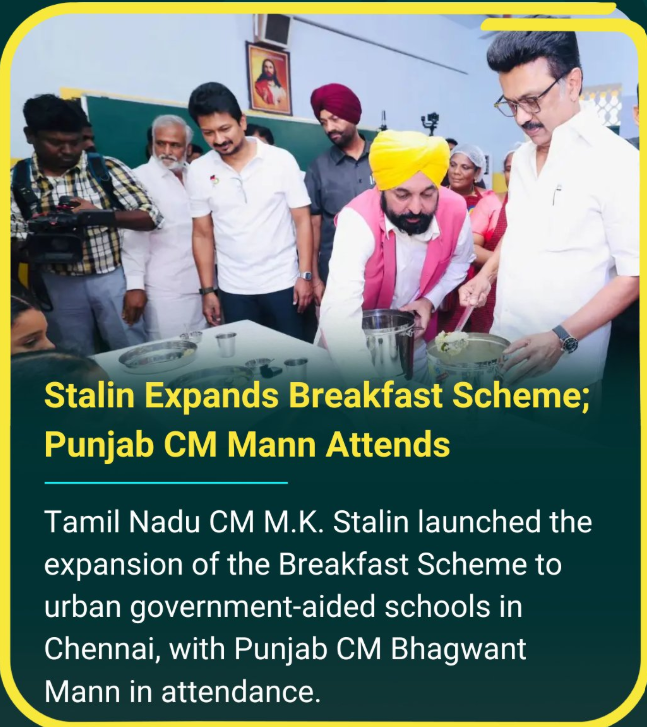PREVIOUS
Expansion of CM Breakfast Scheme - August 2025
August 30 , 2025
16 hrs 0 min
60
0
- Chief Minister MK Stalin launched the extension of the breakfast scheme in government-aided schools in urban areas at Chennai
- It will benefit students from Classes 1 to 5 studying in government-aided schools in urban areas.
- According to a government release, the expansion of the scheme covers 2,430 government-aided primary schools in towns and cities, benefiting 3.06 lakh students in classes 1 to 5.
- In total, the scheme now reaches 17.53 lakh children across 34,987 schools.
- CM Stalin said 20 lakh students will receive nutritious meals through this scheme and Rs 600 crore will be allocated every year for this initiative
- Speaking on the occasion, Punjab CM Bhagwant Mann heaped praise on his Tamil Nadu counterpart for the expansion of the scheme.
- Mann said he will discuss the scheme with his Cabinet colleagues for its implantation in Punjab, as the state was food surplus.
- CM Stalin, on May 6, 2022 announced in the Assembly that a free breakfast program would be introduced for students from Class I to V.
- The first phase of this initiative was launched on September 15, 2022 in Madurai.
- So far, the programme was implemented in government-run primary schools across the State and State-aided primary schools located only in rural areas.
- In March 2023, the programme was expanded to government primary schools in corporation and municipality areas.
- In August that year (2023), it was expanded to all government primary schools in the State.
- In July 2024, the programme was further expanded to all government-aided primary schools in rural areas.
- With the latest expansion to urban areas, students in government-aided schools will be covered.
- This expansion marks the 5th phase of the scheme's implementation.
- It has yielded positive outcomes: increase in attendance, enhanced attention span, and reduction in morbidity rates in primary school-going children.
- It also led to a 63.2% decline in hospital admissions among children in primary classes in government schools and a 70.6% reduction in serious illnesses, between December 2023 and December 2024.
- The State Planning Commission, during an evaluation of the programme, found that it improved eating behaviour in children, fostered positive habits, increased socialisation with other children, showed perceived improvement in the child’s health, increased willingness to go to school.
- It also showed improvement in studies and engagement in class.
- To address quality concerns, the breakfast, noon meal schemes have now adopted two models.
- One is common “cloud kitchens” in cities, where automated cooking ensures uniformity.
- Another one is self-help groups in villages, where parents themselves cook for the children.
- Tamil Nadu government was the first large State in the country that announced to provide HPV vaccination to all girls aged 14 years to prevent cervical cancer.
Political tradition
- The practice of promising food or goods dates back to the 1967 Assembly elections.
- Then Annadurai pledged three seers (3.7 kg) of rice for Rs 1 to fight poverty and hunger.
- In the 1989 state polls, the DMK promised 5 kg of rice to all ration cardholders.
- In 2006, AIADMK offered Rs 2,000 cash assistance for families, while the DMK pledged colour televisions and two acres of farmland to farm labourers.
- The 2011 polls saw the DMK promise free laptops for students, along with a grinder or mixie and 35 kg of rice for every household, while the AIADMK promised free laptops for Class 11 and 12 students, a fan, a mixie, and 20 kg of rice.
- After winning, late AIADMK leader J Jayalalithaa delivered the laptops and other items, but branded them “Amma” products.
- In 2016, the AIADMK went further, promising free mobile phones to all ration cardholders, 100 units of free power to households, and a cow and goat scheme for the poor.
- The DMK, notably, stayed away from such promises that year.
- In the noon meal scheme, too, over time, both the DMK and AIADMK expanded on these commitments.
- Late DMK chief Karunanidhi added eggs to the noon meal in 1989, three eggs a week in 2007, and five by 2010, with bananas for vegetarians.
- Jayalalithaa later introduced “variety rice”.

Leave a Reply
Your Comment is awaiting moderation.


